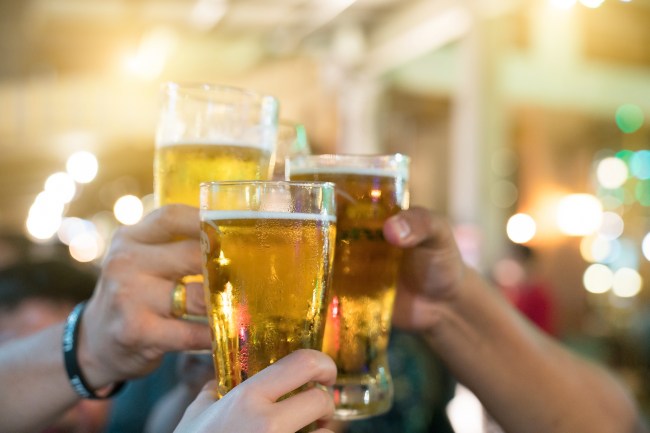
iStockphoto
A World Without Hangovers. Isn’t that a John Lennon song? If not, it should be.
And David Nutt should sing backup vocals.
Nutt, a famed English neuropsychopharmacologist, plans to bring a safe synthetic alcohol substitute called Alcarelle to the general public. According to the Guardian, the award-winning scientist has been developing a super molecule called “alcosynth” that aims to provide the relaxing and socially lubricating qualities of alcohol without the burden of a next-day hangover and more importantly, alcohol-related health issues.
Nutt has long been a critic of the “toxic substance” known as alcohol and was even fired from his position as a government drugs adviser 10 years back for calling out the industry’s hypocrisy in dealing with drugs and alcohol. He once lost his job for claiming that horseback riding was more dangerous than taking ecstasy, while alcohol is more harmful to society than heroin or crack. He cited that horseback riding has one serious adverse event every 350 exposures while with ecstasy there is just one serious adverse event in every 10,000 exposures.
The origin of the Alcarelle story originated as far back as 1983, when Nutt was a PhD student and studying the effects of alcohol on the Gaba system. Alcohol’s main brain function is to stimulate the Gaba receptors, which in turn calms the brain by firing off fewer neurons. Nutt gave rats alcohol before giving them a chemical that blocks Gaba receptors, causing the rats to sober up. The study was too dangerous at the time to be brought to the masses because if a person accidentally took it when sober, it would cause seizures.
Fast forward over three decades and Nutt is determined to prove fellow scientists wrong who say the alcohol antidote is “too challenging” and “too crazy.”
Via The Guardian:
What Nutt now knows is that there are 15 different Gaba receptor subtypes in multiple brain regions, “and alcohol is very promiscuous. It will bind to them all.” Without giving away his trade secrets, he says he has found which Gaba and other receptors can be stimulated to induce tipsiness without adverse effects. “We know where in the brain alcohol has its ‘good’ effects and ‘bad’ effects, and what particular receptors mediate that – Gaba, glutamate and other ones, such as serotonin and dopamine. The effects of alcohol are complicated but … you can target the parts of the brain you want to target.”
Handily, you can modify the way in which a molecule binds to a receptor to produce different effects. You can design a peak effect into it, so no matter how much Alcarelle you consume, you won’t get hammered. This is well-established science; in fact Nutt says a number of medicines, such as the smoking cessation drug varenicline (marketed as Champix), use a similar shut-off effect. You can create other effects, too, while still avoiding inebriation, so you could choose between a party drink or a business-lunch beverage.
Nutt’s ambitious project is far more than a pipe dream. In November 2018, he and his business partner raised £20 million from investors to bring Alcarelle to market. His biggest hurdle, he claims, isn’t the science, but the regulatory hoops they’ll have to jump through to make the product available for public consumption.
The scientist and his team have a five-year plan. Since Alcarelle will likely be regulated as a food additive or an ingredient, they need to create a drink product that they are working with food scientists to develop. This will typically takes three years, but could take longer. Their aim is not to become a drinks company, but to supply companies in the drinks industry with the ingredient, so that they can make and market their own products (think how the tobacco industry has invested in vaping rather than tried to fight it.)
Until then, I’ll have a whiskey, straight.
[h/t The Guardian]